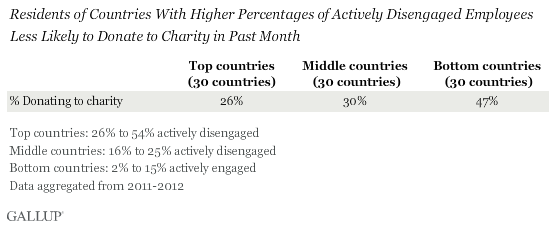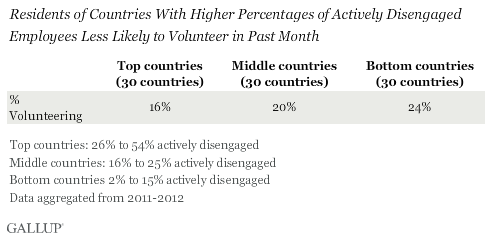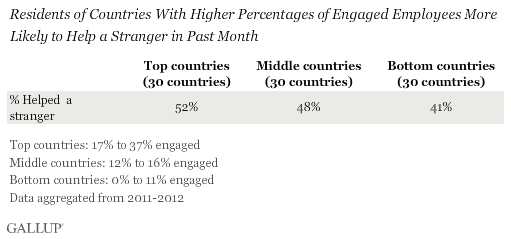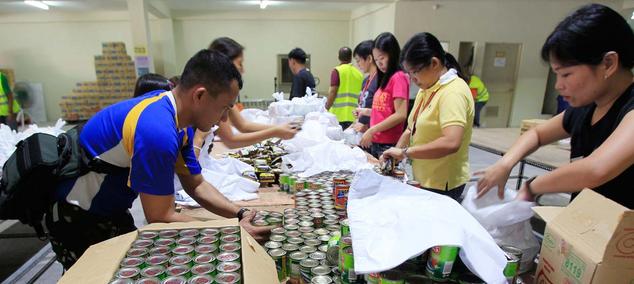Story Highlights
- High percentage of disengaged workers tied to less giving
- High percentage of engaged workers linked to helping strangers
- Disengaged workers more dissatisfied with where they live
WASHINGTON, D.C. -- Actively disengaged employees spread discord on the job and thwart organizational performance, and their negative outlook may not be confined to the workplace. Countries with high percentages of actively disengaged employees tend to have lower percentages of residents who are giving back to their communities. Of the 90 countries Gallup surveyed, about one in four (26%) residents in the countries with the highest percentage of disengaged workers gave money to charity in the last month, compared with nearly half (47%) of residents in countries with the lowest percentages of actively disengaged workers.

Residents of countries with the highest percentages of these actively disengaged workers are not just disinclined to donate money -- they are also less likely to volunteer their time and assistance to others. Sixteen percent of residents in the countries with the highest percentage of actively disengaged workers contributed their time to an organization in the past month, compared with 24% of those in countries with the lowest percentages of actively disengaged workers.

On the other hand, when Gallup looked at civic engagement in countries with higher percentages of engaged employees -- those involved in and enthusiastic about their work -- residents were more likely to assist people they didn't know. More than half (52%) of those in the countries with the highest percentage of engaged employees said they had helped a stranger or someone they didn't know who needed help in the past month, compared with 41% of residents of countries with the lowest percentage of engaged employees.

Gallup has found that adults who donate money to charity, volunteer their time and help strangers are apt to have positive feelings about their communities. This is not the case in countries with high percentages of actively disengaged workers, where residents tend to be dissatisfied with the city or area where they live and the availability of good job opportunities. Their negativity about the city or area where they live may leave them feeling disconnected not only from their workplace but also from the broader community around them.
Unrest, Unemployment May Dampen Altruism
The countries with the highest levels of civic engagement in the past generally have been developed nations with a high degree of political and economic stability. In contrast, many of the countries with the highest percentage of actively disengaged workers in this study are mired in political turmoil and/or are struggling economically. These circumstances may make it more difficult for residents of these countries to reach out to help others. Further, the concept of civic engagement is more of a nascent one in the Middle East and North Africa, where charitable giving and volunteering are usually done on more of an ad hoc practice.
Of the top 30 countries with the highest percentages of actively disengaged workers, 12 are located in the Middle East and North Africa, including nations such as Syria, Tunisia, Egypt, Libya and Bahrain that have experienced protests, uprisings or war since the dawn of the Arab spring in late 2010. Gallup finds the lowest levels of civic engagement in these countries - but this is also related to formal giving being a more Western concept.
Eight European countries also make the list, mostly from Central and Eastern Europe, although Belarus from the Commonwealth of Independent States and France and the U.K. from Western Europe also have high percentages of actively disengaged workers. Most of these economies at the time of the survey in 2011 and 2012 had high unemployment and underemployment and were struggling to recover from the global financial crisis.
Bottom Line
Residents of countries with fewer actively disengaged workers and more engaged workers are more likely to donate money, to volunteer and to help a stranger than are residents of other countries. Many factors potentially contribute to this correlation, including broad economic and cross-cultural differences across countries. As such, Gallup cannot conclude the causal direction in the present data.
Still, residents who face daily uncertainty and strife in their countries experience more negative emotions, which makes it more difficult to see the benefit in altruistic behaviors. They are more likely in a "fight or flight" mindset. An engaging workplace can provide a source of stability that increases the likelihood of positive emotions such as enjoyment and interest. Positive emotions tend to be associated with a higher likelihood of altruistic behaviors, which then benefit the overall community or country.
Survey Methods
Results are based on telephone and face-to-face interviews with 610,014 adults, aged 18 and older, in 90 countries from 2011 to 2012. For results based on the total sample of national adults, one can say with 95% confidence that the maximum margin of sampling error ranges from a low of ±2 percentage points to a high of ±7 percentage points. The margin of error reflects the influence of data weighting. In addition to sampling error, question wording and practical difficulties in conducting surveys can introduce error or bias into the findings of public opinion polls.
For more complete methodology and specific survey dates, please review Gallup's Country Data Set details. Learn more about how the Gallup World Poll works.

